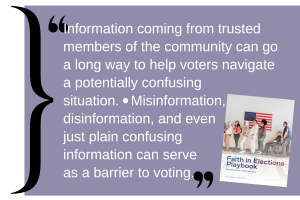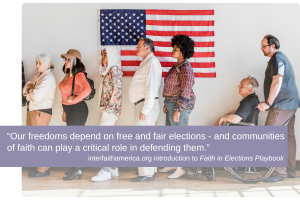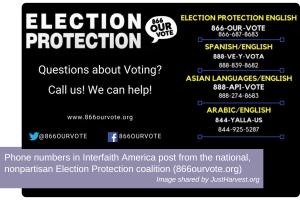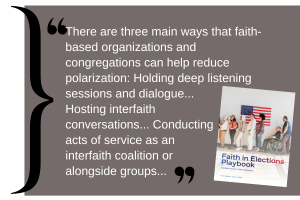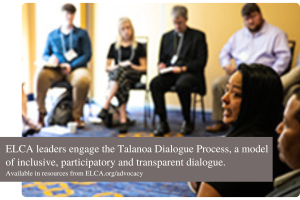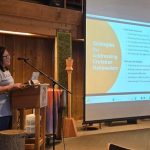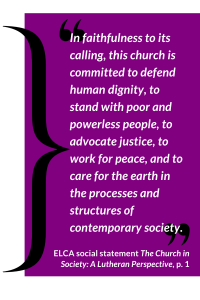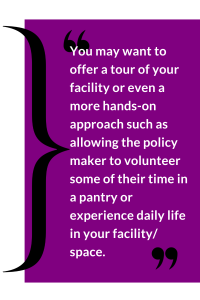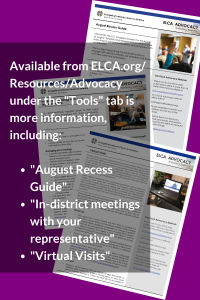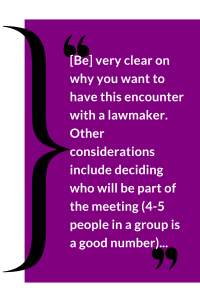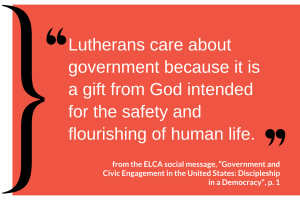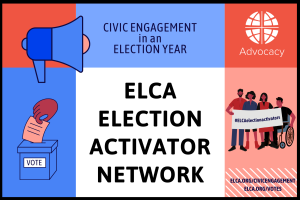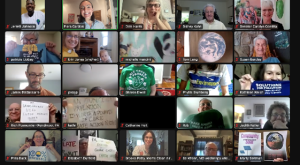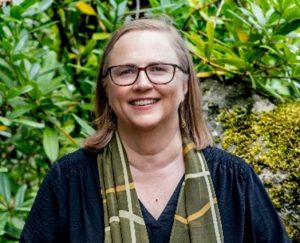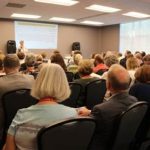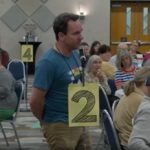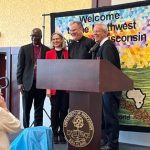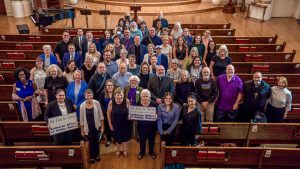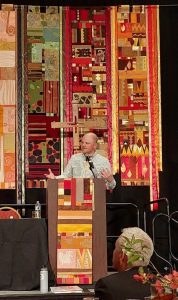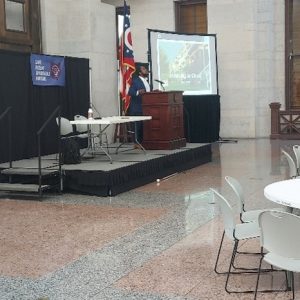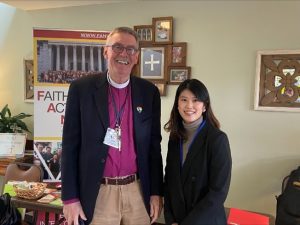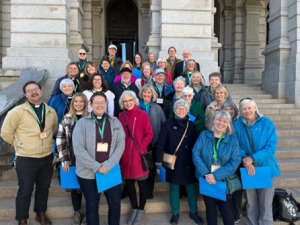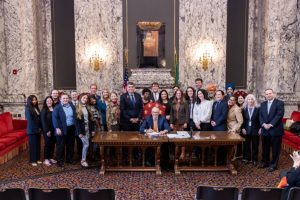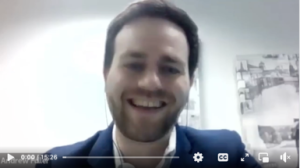from the ELCA advocacy office in Washington, D.C. – the Rev. Amy E. Reumann, Senior Director
Partial expanded content from Advocacy Connections: September 2024
PRESSURE FOR FARM BILL ACTION | INTERIOR AND ENVIRONMENT APPROPRIATIONS FOR FY25 ADVANCE | CONFLICT IN SUDAN | INCREASED CALLS FOR CEASEFIRE & HUMANITARIAN AID, AND RELIGIOUS EQUALITY | ELCA BISHOPS’ HILL VISITS YIELD DIVIDENDS
 PRESSURE FOR FARM BILL ACTION: In congressional meetings across the House and Senate over August recess, ELCA Witness in Society staff continued to press for passage of the Farm Bill alongside many Lutheran constituents from their districts. Congressional staff from both sides of the political aisle have indicated determination to pass a Farm Bill this year – but with limited legislative days remaining in the calendar year, the opportunity to advance a measure is quickly slipping away.
PRESSURE FOR FARM BILL ACTION: In congressional meetings across the House and Senate over August recess, ELCA Witness in Society staff continued to press for passage of the Farm Bill alongside many Lutheran constituents from their districts. Congressional staff from both sides of the political aisle have indicated determination to pass a Farm Bill this year – but with limited legislative days remaining in the calendar year, the opportunity to advance a measure is quickly slipping away.
Why It Matters in the ELCA:
This month, the Department of Agriculture released a new report showing food insecurity has continued to increase – to now 13.8% of all U.S. families, or 47.4 million food insecure Americans. Ahead of Election Day, it is critical that lawmakers continue to hear that hunger, our food systems, and the vitality of our rural communities and our environment are of core concern for Lutherans across the United States. In particular, it is important to highlight the need to preserve and boost support for BOTH hunger programs AND our farming communities in a Farm Bill.
What’s Next:
Advocates can continue to take action on domestic hunger programs via the ELCA Action Center, in addition to the highlighted Farm Bill Action Alerts in our “Farm Bill Updates” blog page. Sending a customized letter this fall urging lawmakers to pass a meaningful Farm Bill before Jan. 1, 2025, will make a critical difference.
 INTERIOR AND ENVIRONMENT APPROPRIATIONS FOR FY25 ADVANCE: Both the U.S. House of Representatives and the Senate have been working toward approving a budget for 2025 (FY25). This includes the budgets for government agencies and programs like the Environmental Protection Agency (EPA) and many environmental justice programs. The House passed a bill that would reduce funding to the EPA by 20% and eliminate these environmental justice programs. The Senate passed their proposed Interior & Environment budget out of committee. Their bill fully maintains topline funding for the EPA and environmental justice programs alike and had bipartisan support through the committee vote.
INTERIOR AND ENVIRONMENT APPROPRIATIONS FOR FY25 ADVANCE: Both the U.S. House of Representatives and the Senate have been working toward approving a budget for 2025 (FY25). This includes the budgets for government agencies and programs like the Environmental Protection Agency (EPA) and many environmental justice programs. The House passed a bill that would reduce funding to the EPA by 20% and eliminate these environmental justice programs. The Senate passed their proposed Interior & Environment budget out of committee. Their bill fully maintains topline funding for the EPA and environmental justice programs alike and had bipartisan support through the committee vote.
Why It Matters in the ELCA:
The ELCA has a history of advocating for the importance of creation care and environmental justice. The strides that the U.S. government has made in addressing environmental justice in particular can only be made possible if we continue to provide robust funding to these programs.
What’s Next:
If the Senate version passes a whole floor vote, these House & Senate versions of the Interior and Environment budget will need to be conferenced (i.e. aligned) to determine how to reconcile the differences and agree on a final budget for 2025. With little time left for Congress to get this done in September, it seems likely that an extension will be passed until the lame duck session in November/December for budget talks to continue.
 CONFLICT IN SUDAN: Negotiations in Switzerland over the conflict in Sudan came to a close at the end of August without sound agreement to end the hostilities, but with major progress in access to humanitarian aid and inclusion of civil society. While Sudan’s military did not send a representative to Switzerland, both sides agreed to greater aid access through the Adre border crossing with Chad and through Port Sudan along the Red Sea. After a consultation meeting with the Department of State and U.S. Government representatives to the talks in Geneva, it was also notable that civil society and marginalized voices were heavily included.
CONFLICT IN SUDAN: Negotiations in Switzerland over the conflict in Sudan came to a close at the end of August without sound agreement to end the hostilities, but with major progress in access to humanitarian aid and inclusion of civil society. While Sudan’s military did not send a representative to Switzerland, both sides agreed to greater aid access through the Adre border crossing with Chad and through Port Sudan along the Red Sea. After a consultation meeting with the Department of State and U.S. Government representatives to the talks in Geneva, it was also notable that civil society and marginalized voices were heavily included.
Why It Matters in the ELCA:
The conflict in Sudan has displaced over 10 million people and more than 25 million people (over half the population) is facing acute hunger, making this one of the largest and most consequential conflicts in the world and a key focus for our global, anti-hunger advocacy. The ELCA has been in many meetings with the U.S. government to express concerns and priorities that would bring an end to the conflict in Sudan, address hunger through humanitarian aid and include voices in the negotiations that are often neglected in peace processes. With both sides moving promisingly toward greater aid access and with the inclusion of a Sudanese women’s delegation – which produced this list of priorities – steps are being made to allow for greater progress in the future.
What’s Next:
The ELCA will continue to meet with U.S. government administration officials to keep up the work that has allowed for progress on humanitarian aid access and inclusivity, while also continuing to urge that future negotiations implement the recommendations of those included voices and focus on durably resolving the violence.
 INCREASED CALLS FOR CEASEFIRE & HUMANITARIAN AID, AND RELIGIOUS EQUALITY: [Editor’s Note: This message was compiled days ago and does not reflect recent developments which ELCA staff is monitoring.] ELCA Middle East and North Africa policy staff have organized meetings with Senior State Department and White House officials to discuss humanitarian aid in Gaza, a ceasefire and recent developments on Israeli taxation of Palestinian churches. In parallel, ELCA staff joined Churches for Middle East Peace-hosted meetings with National Security Council officials on Gaza policy.
INCREASED CALLS FOR CEASEFIRE & HUMANITARIAN AID, AND RELIGIOUS EQUALITY: [Editor’s Note: This message was compiled days ago and does not reflect recent developments which ELCA staff is monitoring.] ELCA Middle East and North Africa policy staff have organized meetings with Senior State Department and White House officials to discuss humanitarian aid in Gaza, a ceasefire and recent developments on Israeli taxation of Palestinian churches. In parallel, ELCA staff joined Churches for Middle East Peace-hosted meetings with National Security Council officials on Gaza policy.
Why It Matters in the ELCA:
In the Message on the War in Gaza (6/5/24), our ELCA presiding bishop affirms that Lutherans care deeply about the people of the Holy Land and about seeking a just resolution to this conflict. “As Christ taught, ‘Blessed are the peacemakers, for they will be called children of God’ (Matthew 5:9). Let us continue to hope and to live our faith.” The ELCA’s relationship with our companion church the Evangelical Lutheran Church in Jordan and the Holy Land continues to inform our care for the victims of the current conflict, the ongoing dehumanization of the occupation, and the specific ways in which policies like imposing taxes on churches threatens their witness and ministry in the Holy Land.
What’s Next:
The ELCA will continue communicating directly with and advocating to senior administration officials who oversee U.S. policy to the region. Congress will return from August recess in the second week of September, when ELCA advocacy staff will take ELCA policy objectives to members officials on the Hill. Current policy adviser Susannah Cunningham (contractor) has been onboarding and transferring responsibilities to newly hired Program Director for Middle East and North Africa Policy Sasha Ghosh-Siminoff, and she will be staying on until early-October to fully transition Ghosh-Siminoff into his new role with the ELCA’s vital advocacy.
 ELCA BISHOPS’ HILL VISITS YIELD DIVIDENDS: On June 10-12, ELCA Witness in Society and Global Refuge hosted several bishops for advocacy in Washington, D.C. Throughout their visit, the bishops were able to express how immigration policies are intricately connected to the welfare of families within their communities from Southeast Minnesota to Texas. The bishops who participated were Bishops Brenda Bos, Susan Briner, Jim Gonia, Regina Hassanally, David Nagler and Michael Rinehart. On Capitol Hill, they discussed federal policies and legislation including the Asylum Seeker Work Authorization Act (H.R.1325), the Afghan Adjustment Act (S. 2327/H.R.4627) and FY25 appropriations for refugee and immigrant accounts.
ELCA BISHOPS’ HILL VISITS YIELD DIVIDENDS: On June 10-12, ELCA Witness in Society and Global Refuge hosted several bishops for advocacy in Washington, D.C. Throughout their visit, the bishops were able to express how immigration policies are intricately connected to the welfare of families within their communities from Southeast Minnesota to Texas. The bishops who participated were Bishops Brenda Bos, Susan Briner, Jim Gonia, Regina Hassanally, David Nagler and Michael Rinehart. On Capitol Hill, they discussed federal policies and legislation including the Asylum Seeker Work Authorization Act (H.R.1325), the Afghan Adjustment Act (S. 2327/H.R.4627) and FY25 appropriations for refugee and immigrant accounts.
Why It Matters in the ELCA:
The bishops, joined by ELCA and Global Refuge staff, met with senior staff at the Department of Homeland Security and the State Department, as well as congressional staff. The visit concluded with an interfaith town hall on immigration accompaniment, featuring administration officials and faith-based organizations. The visit showcased the effectiveness of tying federal policies to local impacts. Bishops wove stories from their congregations to make the case for the Biden Administration and Congress to act in support of immigrant communities.
What’s Next:
In the days that followed, the Biden Administration acted on three policies highlighted during the bishops’ visit: Temporary Protected Status for Haiti, Deferred Enforced Departure for Liberia and relief for undocumented spouses of U.S. citizens, supporting thousands of immigrant families. The last of these, parole in place (PIP) spousal provisions, made over 500,000 undocumented spouses of American citizens eligible for legal status within the US, supporting the goal of keeping families together.
Receive monthly Advocacy Connections directly by becoming part of the ELCA Advocacy network – http://elca.org/advocacy/signup , and learn more from elca.org/advocacy .

